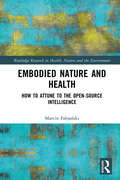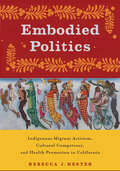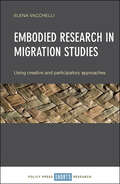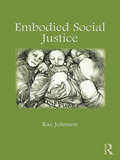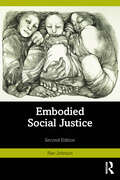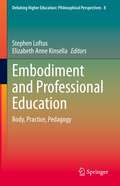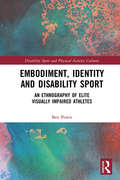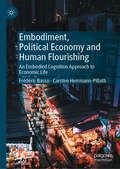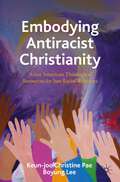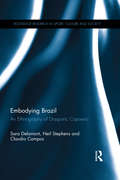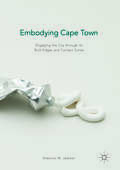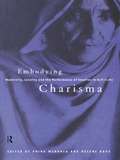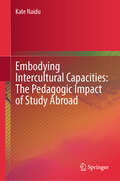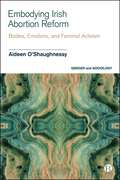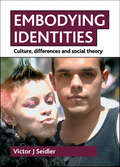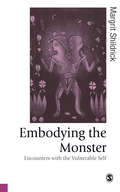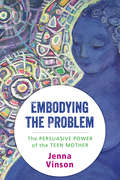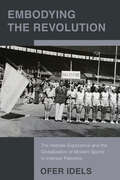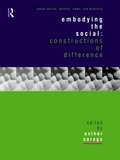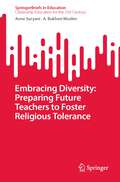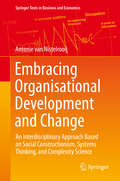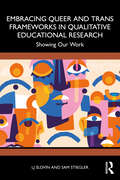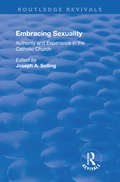- Table View
- List View
Embodied Nature and Health: How to Attune to the Open-source Intelligence (Routledge Research in Health, Nature and the Environment)
by Marcin FabjańskiThis book describes how, as a species our survival and capacity to flourish depends on realizing the intimate relationship of humans with nature through active, embodied participation with nature. Living within the physicality of the planet is not a limitation, rather it is our liberation. Full realization of the consequences of this relationship, through embodied action, can liberate us from ego-dependence and transform us into a community of interdependent and flourishing beings. Embodied Nature and Health: How to Attune to the Open-source Intelligence describes a systems analysis of presence-centered cultivation of well-being through particular ways of being physically and mentally active in relation to nature that aims at helping the individual attune to natures’ rhythms. The systems analysis proposes the hypothesis of the Open-source Intelligence: an intelligence which originates from the placement of individual organisms in the tissue and the process of life. This framework draws upon and integrates contemporary research into the human–nature relationship and human well-being, and ancient philosophies that were developed prior to the Cartesian gap between the mind and the body, as well as using an auto-ethnographic approach dervied from the experience of the author. The proposed system highlights a practical approach to well-being, based on research into human attention and its effective usage in daily life. The book outlines a methodology that can be used in schools, as a basis of training in sports, as well as in the field of self-development, and highlights the necessity to develop a new, non-abusive relationship with the natural environment. This novel, multi-discipline, first-of-its-kind research book will be of strong interest to experts and academics in the fields of physical activity, education, ecology, and philosophy.
Embodied Politics: Indigenous Migrant Activism, Cultural Competency, and Health Promotion in California (Critical Issues in Health and Medicine)
by Rebecca J. HesterEmbodied Politics illuminates the influential force of public health promotion in indigenous migrant communities by examining the Indigenous Health Project (IHP), a culturally and linguistically competent initiative that uses health workshops, health messages, and social programs to mitigate the structural vulnerability of Oaxacan migrants in California. Embodied Politics reconstructs how this initiative came to exist and describes how it operates. At the same time, it points out the conflicts, resistances, and counter-acts that emerge through the IHP’s attempts to guide the health behaviors and practices of Triqui and Mixteco migrants. Arguing for a structurally competent approach to migrant health, Embodied Politics shows how efforts to promote indigenous health may actually reinforce the same social and political economic forces, namely structural racism and neoliberalism, that are undermining the health of indigenous Oaxacans in Mexico and the United States.
Embodied Research in Migration Studies: Using Creative and Participatory Approaches
by Elena VacchelliThe definition of data in qualitative research is expanding. This book highlights the value of embodiment as a qualitative research tool and outlines what it means to do embodied research at various points of the research process. It shows how using this non-invasive approach with vulnerable research participants, such as migrant, refugee and asylum seeking women can help service users or research participants to be involved in the co- production of services and in participatory research. Drawing on both feminist and post-colonial theory, the author uses her own research with migrant women in London, focusing specifically on collage making and digital storytelling, whilst also considering other potential tools for practicing embodied research such as yoga, personal diaries, dance and mindfulness. Situating the concept of ‘embodiment’ on the map of research methodologies, the book combines theoretical groundwork with actual examples of application to think pragmatically about intersectionality through embodiment.
Embodied Social Justice
by Rae JohnsonEmbodied Social Justice introduces a body-centered approach to working with oppression, designed for social workers, counselors, educators, and other human service professionals. Grounded in current research, this integrative approach to social justice works directly with the implicit knowledge of our bodies to address imbalances in social power. Consisting of a conceptual framework, case examples, and a model of practice, Embodied Social Justice integrates key findings from education, psychology, traumatology, and somatic studies while addressing critical gaps in how these fields have understood and responded to everyday issues of social justice.
Embodied Social Justice
by Rae JohnsonEmbodied Social Justice introduces an embodied approach to working with oppression. Grounded in current research, the book integrates key findings from education, psychology, sociology, and somatic studies while addressing critical gaps in how these fields have addressed pervasive patterns of social injustice. At the heart of the book, a series of embodied narratives bring to life everyday experiences of oppression through evocative descriptions of how power implicitly shapes body image, interpersonal space, eye contact, gestures, and the use of touch. This second edition includes two new "body stories" from research participants living and working in the global South. Supplemental guidelines for practice, updated references, and new community resources have also been added. Designed for social workers, counselors, educators, and other human service professionals working with members of disenfranchised and marginalized communities, Embodied Social Justice offers a conceptual framework and model of practice to assist in identifying, unpacking, and transforming embodied experiences of oppression from the inside out.
Embodiment and Mechanisation: Reciprocal Understandings of Body and Machine from the Renaissance to the Present
by Daniel BlackDrawing on philosophical, neurological and cultural answers to the question of what constitutes a body, this book explores the interaction between mechanistic beliefs about human bodies and the successive technologies that have established and illustrated these beliefs. At the same time, it draws upon newer perspectives on technology and embodied human thought in order to highlight the limitations and inadequacies of such beliefs and suggest alternative perspectives. In so doing, it provides a position from which widely held assumptions about our relationship with technology can be understood and questioned, by both showing how these presuppositions have emerged and developed, and examining the extent to which they are dependent upon our grasp of specific technologies. Illustrated with examples from the Renaissance and Enlightenment periods, as well as the industrial age and the recent eras of informatics, gene science and nanotechnology, Embodiment and Mechanisation highlights the ways in which technological changes have led to shifts in the definition of machine and body, investigating their shared underlying belief that all matter can be reduced to a common substance. From clockwork and cadavers to engines and energy, this volume reveals our long-standing fascination with and enduring commitment to the idea that bodies are machines and that machines are in some sense bodies. As such, it will appeal to scholars across the humanities and social sciences with interests in the sociology of science and technology, embodiment, cultural studies and the history of ideas.
Embodiment and Professional Education: Body, Practice, Pedagogy (Debating Higher Education: Philosophical Perspectives #8)
by Stephen Loftus Elizabeth Anne KinsellaThis book draws attention to the ways in which an awareness of, and sensitivity to, embodiment can enlighten educational practices. It explores discourses from a range of thinkers, including Merleau-Ponty, Gadamer, Bakhtin, Haraway and Ahmed to name a few. The book argues that attention to embodiment can help us to reimagine the goals of education in ways that fit more coherently with human concerns and that offer the chance to provide education that is more holistic and grounded in our corporeality. Theories of embodiment can be used to modify education at the level of curriculum and at the level of pedagogy. This can help us design educational interventions that fit more naturally with how humans are inclined to learn and thus make educational experiences more meaningful. Attention to embodiment allows us to appreciate the extent to which the body appropriates a professional practice and the extent to which a professional practice appropriates the body of the learner. It shows how greater sensitivity to the body can enliven and enlighten our educational practices, especially in professional education.
Embodiment, Identity and Disability Sport: An Ethnography of Elite Visually Impaired Athletes (Disability Sport and Physical Activity Cultures)
by Ben PowisThis book investigates the complex relationship between embodiment, identity and disability sport, based on ethnographic research with an international-level visually impaired cricket team. Alongside issues of empowerment, classification and valorisation, it conceptualises the sensuous dimension of being in disability sport and challenges the idealised notion of the sporting body. It explores the players’ lived experiences of participating and competing in an elite disabled sport culture and uses an embodied theoretical approach drawing upon sociology, phenomenology and contemporary disability theory to examine aspects of this previously unexamined research "site," both on and off the pitch. Written in a way that values and accurately represents the participants’ traditionally marginalised voices, the book analyses the role that elite disability sport plays in the construction of identity and helps us to better understand the relationships between disability, sport and wider society. Embodiment, Identity and Disability Sport is essential reading for any student, researcher, practitioner or policymaker working in disability sport, and a source of useful new perspectives for anybody with an interest in the sociology of sport or disability studies.
Embodiment, Political Economy and Human Flourishing: An Embodied Cognition Approach to Economic Life
by Carsten Herrmann-Pillath Frédéric BassoThis book presents embodied economics as a foundational alternative to behavioral economics and other projects integrating economics and psychology inspired by the computational paradigm. The 20th century witnessed the disembodiment of economic models through the intensification of mathematization and formal abstraction in economics. Even proponents of an embodied approach to cognition, such as Hayek, paradoxically championed the abstract market order as a disembodied superhuman intelligence. In the wake of groundbreaking perspectives in cognitive and social sciences, which have helped to rethink the fundamental building blocks of economics, agency and institutions, this title takes a radical turn towards embodiment. Reinstating economics as political economy, embodied economics motivates a critique of capitalism based on the analysis of disembodiment through abstraction and reactivates key critical insights into the anthropology put forward by the young Marx about contemporary economics and its conceptualizations of money, property, and labor. Based on this analysis, the authors envision a concrete utopia for an economic order centered on human dignity and care for life on Earth. This book contributes to recent discussions about behavioral, experimental and neuroeconomics and addresses a transdisciplinary audience in the social and behavioral sciences, philosophy, and the humanities.
Embodying Antiracist Christianity: Asian American Theological Resources for Just Racial Relations
by Boyung Lee Keun-joo Christine PaeAt a moment of notably rising levels of anti-Asian hate, this book offers antiracist resources informed by Asian/North American feminist theology and biblical scholarship. Although there exist scholarly books and articles on Asian American theology (broadly defined) have proliferated in response to the current ethical, political, and cultural environment have been prolific, there have been few concerted efforts to interrogate or dismantle anti-Asian racism inseparable from anti-black racism, and white settler colonialism that have often undermined the communal spirit and livelihood of Christian churches in the current political climate. In the current political climate, COVID-related anti-Asian hate and racial conflict, which all intersect with gender and sexuality-based violence, require theological, moral, and political inquiries. Hence, this book notes the current paucity of work with critical discussions on the multiple facets of racism from Asian American feminist theological perspectives. Contributors deepen the inter/transdisciplinary approaches concerning how to dismantle racist theological teachings, biblical interpretations, liturgical presentations, and the Christian church’s leadership structure.
Embodying Brazil: An ethnography of diasporic capoeira (Routledge Research in Sport, Culture and Society)
by Sara Delamont Neil Stephens Claudio CamposThe practice of capoeira, the Brazilian dance-fight-game, has grown rapidly in recent years. It has become a popular leisure activity in many cultures, as well as a career for Brazilians in countries across the world including the US, the UK, Canada and Australia. This original ethnographic study draws on the latest research conducted on capoeira in the UK to understand this global phenomenon. It not only presents an in-depth investigation of the martial art, but also provides a wealth of data on masculinities, performativity, embodiment, globalisation and rites of passage. Centred in cultural sociology, while drawing on anthropology and the sociology of sport and dance, the book explores the experiences of those learning and teaching capoeira at a variety of levels. From beginners’ first encounters with this martial art to the perspectives of more advanced students, it also sheds light on how teachers experience their own re-enculturation as they embody the exotic ‘other’. Embodying Brazil: An Ethnography of Diasporic Capoeira is fascinating reading for all capoeira enthusiasts, as well as for anyone interested in the sociology of sport, sport and social theory, sport, race and ethnicity, or Latin-American Studies.
Embodying Cape Town
by Shannon M. JacksonThis book examines the reciprocity that exists between the body and the urban built environment. It will draw on archival and ethnographic research as well as an interdisciplinary literature on cultural materialism, semiotics, and aesthetics to challenge dualist interpretations of four different points of historical-material contact in Cape Town, South Africa. Each chapter attends to different groups, social practices, and historical periods, but all share the fundamental questions: how does material culture reflect the way social agents make meaning through bodily contact with urban built form, and how does such meaning challenge the ways bodies are objectified? Further, how can we make sense of the historical processes embedded in the objectification of bodies without treating the social and the material, the mental and the physical as separate realities?
Embodying Charisma: Modernity, Locality and the Performance of Emotion in Sufi Cults
by Pnina Werbner Helene BasuThe continued vitality of Sufism as a living embodied postcolonial reality challenges the argument that Sufism has 'died' in recent times. Throughout India and Bangladesh, Sufi shrines exist in both the rural and urban areas, from the remotest wilderness to the modern Asian city, lying opposite banks and skyscrapers.This book illuminates the remarkable resilience of South Asian Sufi saints and their cults in the face of radical economic and political dislocations and breaks new ground in current research. It addresses the most recent debates on the encounter between Islam and modernity and presents important new comparative ethnographic material.Embodying Charisma re-examines some basic concepts in the sociology and anthropology of religion and the organization of religious movements.
Embodying Design: An Applied Science of Radical Embodied Cognition
by Christopher BaberRethinking design through the lens of embodied cognition provides a novel way of understanding human interaction with technology. In this book, Christopher Baber uses embodied cognition as a lens through which to view both how designers engage in creative practices and how people use designed artifacts. This view of cognition as enactive, embedded, situated, or distributed, without recourse to internal representations, provides a theoretical grounding that makes possible a richer account of human interaction with technology. This understanding of everyday interactions with things in the world reveals opportunities for design to intervene. Moreover, Baber argues, design is an embodied activity in which the continual engagement between designers and their materials is at the heart of design practice. Baber proposes that design and creativity should be considered in dynamic, rather than discrete, terms and explores &“task ecologies&”—the concept of environment as it relates to embodied cognition. He uses a theory of affordance as an essential premise for design practice, arguing that affordances are neither form nor function but arise from the dynamics within the human-artifact-environment system. Baber explores agency and intent of smart devices and implications of tangible user interfaces and activity recognition for human-computer interaction. He proposes a systems view of human-artifact-environment interactions—to focus on any one component or pairing misses the subtleties of these interactions. The boundaries between components remain, but the borders that allow exchange of information and action are permeable, which gives rise to synergies and interactions.
Embodying Intercultural Capacities: The Pedagogic Impact of Study Abroad
by Kate NaiduThis book examines the extent to which in-country education contributes to the development of intercultural capacities among students and investigates how this occurs. It examines the experiences of Australian university students participating in educational programs in Indonesia and critiques and extends notions of interculturality. The potential development of intercultural capacities is explored in relation to four key themes: pedagogy, temporality, home, and culture. The book demonstrates that interculturalisation is not an automatic or guaranteed result of simply being ‘immersed’ in-country, but rather involves an array of pedagogic processes (involving both human and non-human actors). It outlines the temporal dimensions of in-country education, examining the experience as part of a broader trajectory, involving significant moments, and a range of engagements with diverse temporal rhythms. The book concludes by exploring how students’ understandings of ‘culture’ and ‘cultural difference’ impact the way in which the study-abroad experience is navigated. Readers will gain a deepened understanding of how intercultural capacities develop, which can be applied to other educational contexts including schools, as well as corporate and not-for-profit settings. Those interested in sociology, particularly Bourdieusian analysis, will also benefit from this empirical application (and extension) of the notion of habitus in the context of student mobility. “This is a well conceptualized and beautifully written book that explores how study abroad programs can play an important role in equipping young people to navigate the super-diversity that has now become a critical feature of societies around the world. It shows how such programs have the potential to enhance intercultural capacities, especially when crafted in ways that are thoughtfully fashioned and carefully enacted.” — Fazal Rizvi, University of Melbourne Australia
Embodying Irish Abortion Reform: Bodies, Emotions, and Feminist Activism (Gender and Sociology)
by Aideen O’ShaughnessyOffering a unique perspective, this book explores the lived, embodied and affective experiences of reproductive rights activists living under, and mobilizing against, Ireland’s constitutional abortion ban. Through qualitative research and in-depth interviews with activists, the author exposes the subtle influence of the 8th Amendment on Irish women and their (reproductive) bodies, whether or not they have ever attempted to access a clandestine abortion. It explains how the everyday embodied practices, bodily labours and affective experiences of women and gestating people were shaped by the 8th amendment and through the need to ‘prepare’ for crisis pregnancies. In addition, it reveals the integral role of women’s bodies and emotions in changing the political and social landscape in Ireland, through the historical transformation of the country’s abortion laws.
Embodying identities: Culture, differences and social theory
by Victor Jeleniewski SeidlerIn the 1970s and 1980s, identities seemed to be 'fixed' through categories of class, 'race', ethnicity, gender, sexualities and religion. These days we have begun to recognise the diversity, fragmentation and fluidity of identities, but how do we create and shape our own? The book shapes a new language of social theory that allows people to embody their differences with a sense of dignity and self-worth. It draws on diverse traditions from Marx, Weber and Durkheim, as well as more recent traditions of critical theory and post-structuralism, and will be of interest to sociology, politics, social work, philosophy and cultural studies students.
Embodying the Monster: Encounters with the Vulnerable Self (Published in association with Theory, Culture & Society)
by Dr Margrit ShildrickWritten by one of the most distinguished commentators in the field, this book asks why we see some bodies as 'monstrous' or 'vulnerable' and examines what this tells us about ideas of bodily 'normality' and bodily perfection. Drawing on feminist theories of the body, biomedical discourse and historical data, Margrit Shildrick argues that the response to the monstrous body has always been ambivalent. In trying to organize it out of the discourses of normality, we point to the impossibility of realizing a fully developed, invulnerable self. She calls upon us to rethink the monstrous, not as an abnormal category, but as a condition of attractivenes, and demonstrates how this involves an exploration of relationships between bodies and embodied selves, and a revising of the phenomenology of the body.
Embodying the Problem: The Persuasive Power of the Teen Mother
by Jenna VinsonThe dominant narrative of teen pregnancy persuades many people to believe that a teenage pregnancy always leads to devastating consequences for a young woman, her child, and the nation in which they reside. Jenna Vinson draws on feminist and rhetorical theory to explore how pregnant and mothering teens are represented as problems in U.S. newspapers, political discourses, and teenage pregnancy prevention campaigns since the 1970s. Vinson shows that these representations prevent a focus on the underlying structures of inequality and poverty, perpetuate harmful discourses about women, and sustain racialized gender ideologies that construct women’s bodies as sites of national intervention and control.Embodying the Problem also explores how young mothers resist this narrative. Analyzing fifty narratives written by young mothers, the recent #NoTeenShame social media campaign, and her interviews with thirty-three young women, Vinson argues that while the stigmatization of teenage pregnancy and motherhood does dehumanize young pregnant and mothering women, it is at the same time a means for these women to secure an audience for their own messages. More information on the author's website (https://jennavinson.com)
Embodying the Revolution: The Hebrew Experience and the Globalization of Modern Sports in Interwar Palestine
by Ofer IdelsThis original and thought-provoking study offers a fresh perspective on Zionism by exploring Hebrew culture’s ambivalent attitude toward modern sports. Drawing on extensive archival sources and contemporary literary theories, it focuses on Zionism’s surprising anxiety toward sports during the interwar heyday of “muscular Judaism,” revealing an unusual society in which athletes failed to attain national pride and distinction. Addressing themes such as the body, language, space, immigration, internationalism, amateurism, gender, and militarization, Embodying the Revolution presents an innovative reading of Jewish life in Mandate Palestine, linking the marginalization of sports to the meaning and experience of the Zionist Revolution. Idels' compelling interpretation of the appeal of sports, selfhood, and the compromises inherent in radical aspirations—narrated from the periphery of the interwar global rise of sports—challenges contemporary assumptions that dismiss ideology as an elitist myth.
Embodying the Social: Constructions of Difference
by Esther SaragaThis book opens the series with a consideration of the social construction of social difference. Taking the body as the point of departure, it deals with the processes through which social problems and social inequalities are constructed. In particular, it examines the shifting ways in which our ideas about issues such as 'disability', 'race' and ethnicity, and sexuality influence the development of social policies.
Embracing Diversity: Preparing Future Teachers to Foster Religious Tolerance (SpringerBriefs in Education)
by Anne Suryani A. Bukhori MuslimThis book presents a detailed discussion of Indonesian future teachers’ experience of religious diversity, tolerance and intolerance, their level of intellectual humility, and intentions to foster religious tolerance. Drawing from large-scale mixed methods research conducted in Indonesian universities involving over one thousand three hundred future teachers from diverse religious backgrounds, this book demonstrates that religion and religious beliefs can, and do, shape the way future teachers view their teaching practices and pedagogies. The book sheds light into the under-researched yet prominent issue of integrating tolerance into teacher education preparation. It is set in the largest Muslim-majority country in the world which, in recent years, has seen a gradual degradation of secularity while religion becomes more dominant across all levels and sectors of society. This novel and timely book is of interest to researchers, scholars, and students in religious studies, education, social sciences, and Asian studies, as well as anyone interested in the interplay between religion and education in the 21st century.
Embracing Organisational Development and Change: An Interdisciplinary Approach Based on Social Constructionism, Systems Thinking, and Complexity Science (Springer Texts in Business and Economics)
by Antonie van NistelrooijThis book focuses on human behavioural processes and describes them from an interdisciplinary perspective. It introduces readers to the main theories and approaches in the field of organisational development and change (ODC), and discusses their relevance and purpose with a clear focus on improving how readers perceive and handle change. The book is tailor-made for business students without any background in the humanities, helping them to conceptualise organisational development and change, and to practically organise interventions to increase organisational effectiveness. The book’s goal is to help future managers and consultants recognise and handle the ‘full situation’, which includes purposes, people and relationships. Furthermore, it elaborates on those theories and instruments that can deliver real benefits to real people working in real fuzzy and complex circumstances, and includes several practical cases focusing on the role of the interventionist.
Embracing Queer and Trans Frameworks in Qualitative Educational Research: Showing Our Work
by Sam Stiegler LJ SlovinEmbracing Queer and Trans Frameworks in Qualitative Educational Research reflects on a decade of conversations about research, thinking, and life, exploring how to navigate the ethical complexities of working with queer and trans youth as queer and trans scholars. The authors introduce the framework of “showing our work,” an intimate approach that revisits the often- invisible processes behind what becomes the ‘final’ product. This lens offers a fresh, rarely told account of how research is made, highlighting the messy, reflective, and transformative moments that shape scholarly inquiry.By showing their work, the authors invite educational researchers to engage with these moments in their own practice – thinking alongside the discussions and decisions that shape methodological choices. They argue for the vital role of queer and trans methodologies in qualitative educational research, positioning them not just as subjectspecific tools but as critical lines of analytical inquiry. Drawing from their own research with queer and trans youth, both within and beyond educational spaces, the authors revisit and reimagine pivotal moments that challenged, provoked, and ultimately shaped key elements of their published work. Through this process, they create a generative space for methodological reimagining, situating ethnographic work with queer and trans youth as fertile ground for new ways of knowing.This book is essential reading for students across disciplines, as well as qualitative researchers engaged in youth studies, critical methodologies, sociology, and queer and trans studies.
Embracing Sexuality: Authority and Experience in the Catholic Church (Routledge Revivals Ser.)
by Joseph SellingThis title was first published in 2001. This text examines sexuality and interpersonal relationships in relation to the Catholic Church. Topics discussed include spirituality; sexuality; bodiliness and sacramentality; the female experience of sexuality; authority; and the development of Catholic tradition and sexual morality.
